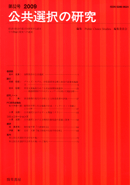Volume 2009, Issue 53
Displaying 1-16 of 16 articles from this issue
- |<
- <
- 1
- >
- >|
Foreword
-
2009Volume 2009Issue 53 Pages 1-4
Published: December 15, 2009
Released on J-STAGE: June 28, 2013
Download PDF (306K)
Articles
-
2009Volume 2009Issue 53 Pages 5-13
Published: December 15, 2009
Released on J-STAGE: June 28, 2013
Download PDF (382K) -
2009Volume 2009Issue 53 Pages 14-29
Published: December 15, 2009
Released on J-STAGE: June 28, 2013
Download PDF (624K)
Notes
-
2009Volume 2009Issue 53 Pages 30-43
Published: December 15, 2009
Released on J-STAGE: June 28, 2013
Download PDF (518K) -
2009Volume 2009Issue 53 Pages 44-52
Published: December 15, 2009
Released on J-STAGE: June 28, 2013
Download PDF (351K)
Workshop Reports
-
2009Volume 2009Issue 53 Pages 53-57
Published: December 15, 2009
Released on J-STAGE: June 28, 2013
Download PDF (438K) -
2009Volume 2009Issue 53 Pages 58-62
Published: December 15, 2009
Released on J-STAGE: June 28, 2013
Download PDF (327K)
Conference Reports
-
2009Volume 2009Issue 53 Pages 63-71
Published: December 15, 2009
Released on J-STAGE: June 28, 2013
Download PDF (400K) -
2009Volume 2009Issue 53 Pages 72-73
Published: December 15, 2009
Released on J-STAGE: June 28, 2013
Download PDF (265K)
Communications
-
2009Volume 2009Issue 53 Pages 74-77
Published: December 15, 2009
Released on J-STAGE: June 28, 2013
Download PDF (277K)
Materials
-
2009Volume 2009Issue 53 Pages 78-79
Published: December 15, 2009
Released on J-STAGE: June 28, 2013
Download PDF (231K) -
2009Volume 2009Issue 53 Pages 80-82
Published: December 15, 2009
Released on J-STAGE: June 28, 2013
Download PDF (296K)
Book Reviews
-
2009Volume 2009Issue 53 Pages 83-87
Published: December 15, 2009
Released on J-STAGE: June 28, 2013
Download PDF (332K) -
2009Volume 2009Issue 53 Pages 88-91
Published: December 15, 2009
Released on J-STAGE: June 28, 2013
Download PDF (276K) -
2009Volume 2009Issue 53 Pages 92-95
Published: December 15, 2009
Released on J-STAGE: June 28, 2013
Download PDF (325K)
Information
-
2009Volume 2009Issue 53 Pages 96
Published: December 15, 2009
Released on J-STAGE: June 28, 2013
Download PDF (207K)
- |<
- <
- 1
- >
- >|
